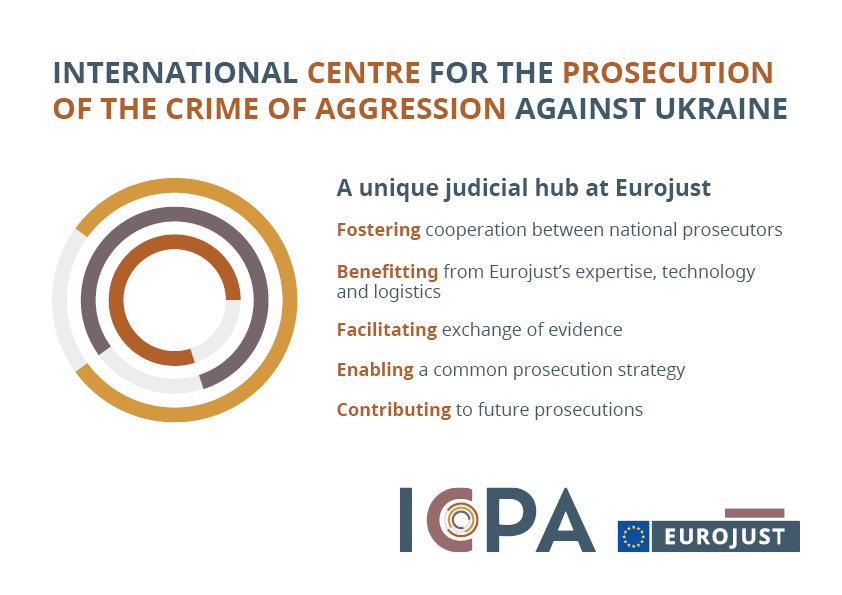International Centre for the Prosecution of the Crime of Aggression against Ukraine

A unique judicial hub at Eurojust
Fostering cooperation between national prosecutors
Benefitting from Eurojust's expertise, technology and logistics
Facilitating exchange of evidence
Enabling a common prosecution strategy
Contributing to future prosecutions

The ICPA is a unique judicial hub embedded in Eurojust to support national investigations into the crime of aggression related to the war in Ukraine. Thanks to the ICPA, independent prosecutors from different countries are able to work together in the same location on a daily basis, exchange evidence in a fast and efficient manner, and agree on a common investigative and prosecution strategy. The work of the ICPA will effectively prepare and contribute to any future prosecutions of the crime of aggression, irrespective of the jurisdiction before which these will be brought.
Participants in the ICPA benefit from Eurojust’s tailor-made operational, technical, logistical and financial support. The Core International Crimes Evidence Database (CICED), managed by Eurojust, is central in enabling the ICPA’s work. Evidence already submitted to CICED in the context of other international crimes (crimes of genocide, crimes against humanity and war crimes) may be equally relevant for the investigation into the crime of aggression. It is also possible to store national evidence in CICED brought in by ICPA participants for analysis.
Being located in The Hague has several advantages. Not only does the ICPA have direct access to the valuable expertise of the Genocide Network Secretariat hosted at Eurojust, but it also benefits from close cooperation and coordination with the ICC and other international justice actors.
How did the ICPA come about?
The crime of aggression is a crime committed by the highest political and military leadership. Given that Russia is not a party to the Rome Statute, the ICC cannot prosecute the Russian leadership for the crime of aggression in the context of Russia's war against Ukraine.
To close this gap, in November 2022 the European Commission and the European External Action Service presented a paper analysing the different options to ensure full accountability for the crimes committed in the context of the Russian war against Ukraine, including the crime of aggression.
The ICPA is the first step in this process to preserve evidence and prepare cases for future trials, be it before national courts, a dedicated tribunal or the International Criminal Court for crimes within its jurisdiction.
The President of the European Commission Ursula von der Leyen announced the setting up of the International Centre for the Prosecution of the Crime of Aggression Against Ukraine at the 24th EU-Ukraine Summit on 2 February 2023.
What makes the ICPA urgent and unique?
The war in Ukraine is the most documented in history, and, for the first time, active investigations into the crime of aggression are taking place while an armed conflict is still ongoing. At the same time, we are dealing with an international crime that has rarely been prosecuted and for which there is no standard practice.
The swift establishment of the ICPA bridges the gap between ambitions and reality, bringing together relevant stakeholders, securing crucial evidence and making sure that no time is lost in building a case for the future prosecution of the crime of aggression. In doing so, the legal community is delivering a clear message that those responsible for the crime of aggression against Ukraine will be held accountable.
Participants in the ICPA
In addition to Ukraine, five of the joint investigation team (JIT) members (Lithuania, Latvia, Estonia, Poland and Romania) are participating in the ICPA’s start-up phase. The Office of the Prosecutor of the ICC also contributes to the work of the ICPA. Following a Memorandum of Understanding with the JIT members, the United States appointed a Special Prosecutor for the Crime of Aggression, who supported the ICPA’s activities.
In the coming months, the participation of other countries and organisations in the ICPA, such as the EU Advisory Mission to Ukraine, will be facilitated. Countries in possession of information or evidence relevant to the investigation of the crime of aggression against Ukraine may also request their participation.
ICPA funding
The ICPA is fully funded by the European Commission’s Service for Foreign Policy Instruments. A financial contribution agreement covering an initial amount of EUR 8.3 million has been signed by the Director of the European Commission’s Service for Foreign Policy Instruments and Eurojust’s Administrative Director.
Publications

ICPA explainer
Press releases
Videos
International Centre for the Prosecution of the Crime of Aggression against Ukraine (ICPA)
The International Centre for the Prosecution of the Crime of Aggression against Ukraine (ICPA) is a unique judicial hub embedded in Eurojust to support national investigations into the crime of aggression related to the war in Ukraine. Thanks to the ICPA, independent prosecutors from different countries are able to work together in on a daily basis, exchange evidence, and agree on a common investigative and prosecution strategy. The work of the ICPA is preparing or contributing to any future prosecutions of the crime of aggression.
Launch of the International Centre for the Prosecution of the Crime of Aggression
3 July 2023
Press conference - Launch of the International Centre for the Prosecution of the Crime of Aggression
3 July 2023
Q&As
Q&As
Over the past 20 years, Eurojust has built up a solid track record in providing operational, technical, logistical and financial support to national prosecutors working on cross-border cases. From the very start of the Russian war of aggression against Ukraine, the same support has served to coordinate and strengthen national investigations into international crimes committed in Ukraine.
Eurojust helped to set up a Joint Investigation Team that now consists of Ukraine, six EU Member States and the ICC.
Recognising the specific evidentiary challenges related to this type of investigations, a Core International Crimes Evidence Database was established after a record speed amendment of Eurojust’s legal framework.
Already having this advanced support structure in place made Eurojust a logical choice for hosting the ICPA. Being located in The Hague will also facilitate close cooperation and coordination with the ICC and other international justice actors.
A JIT is set up by countries. It is based on a legal agreement between national authorities for the purpose of collecting and exchanging information and evidence.
The ICPA is set up by Eurojust. The purpose is to provide enhanced support to countries which have opened an investigation into the crime of aggression against Ukraine. Eurojust will not be collecting evidence itself; this will be done by national authorities in the context of their investigations.
The ICPA is not limited to JIT members but will provide support to the JIT.
Countries in possession of information or evidence relevant for the investigation of the crime of aggression against Ukraine may also request their participation in the ICPA.
The ICPA was set up in support of national judicial investigations into the crime of aggression that are being carried out by independent prosecutors and judges.
While having facilitated the discussions between stakeholders about setting up the ICPA, the European Commission, in full respect of the rule of law, has no influence on the prosecutorial process.
War crimes, crimes against humanity, genocide and aggression are all international crimes. While the legal sources that outlaw these crimes differ, they have in common that they constitute grave violations of international law and are therefore considered of concern to the international community as a whole.
As such, war crimes, crimes against humanity and genocide fall within the jurisdiction of the International Criminal Court if committed by a national of a state party, on the territory of a state party or triggered by the United Nations Security Council. A different test applies to the exercise of jurisdiction over the crime of aggression than for the other core international crimes.
The international definition considers the crime of aggression as a leadership crime that can only be committed by those with the power to shape a state's policy of aggression, rather than those who carry it out.
Countries in possession of information or evidence relevant for the investigation of the crime of aggression against Ukraine may request to participate in the ICPA.
While difficult to predict at this stage, a wider interest to participate may be expected in light of the unprecedented number of Ukraine-related national investigations.
It is also expected that the ICPA will be able to count on the knowledge of internationally recognised experts in this field, as many stakeholders have offered to support the ICPA in this manner.
There is a clear link between the work of the ICPA and the CICED. Evidence already submitted to CICED may be relevant for the investigation into the crime of aggression. Vice versa, national evidence brought in by ICPA participants can be stored in CICED and subsequently analysed.
